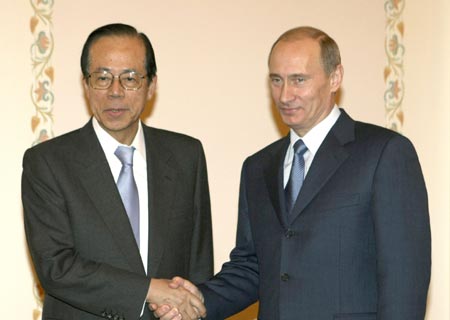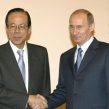
RUSSIA STRUGGLES TO ENCOURAGE JAPANESE INVESTMENTS
Publication: Eurasia Daily Monitor Volume: 5 Issue: 81
By:

Japanese Prime Minister Yasuo Fukuda has made his first trip to Russia since his election last September. Despite optimistic official pronouncements, Russia appears to be struggling to secure any significant economic commitments from Tokyo, notably on the Pacific-bound oil pipeline route. Meanwhile, both sides remained divided over their long-standing territorial dispute.
Outgoing President Vladimir Putin told Fukuda that in the past two or three years, there had been significant changes in bilateral relations. Putin noted what he described as the “stable character” of Russo-Japanese relations. “We are continuing the dialogue toward a peace treaty and are creating the necessary conditions for further progress,” he said on April 26. Bilateral trade had increased by five times since 2003, Putin said. He also referred to the continued growth of Japanese investments in Russia but conceded that problems remained in bilateral ties (Interfax, RIA Novosti, April 26).
On April 26 Putin and Fukuda reportedly discussed a peace treaty but failed to solve disagreements over the territorial dispute. After the meeting, Putin’s press service only said that the territorial dispute had not been discussed in detail. Fukuda’s talks with president elect Dmitry Medvedev focused on the G8 summit to be held in July on the Japanese island of Hokkaido, but few details of the meeting were released (Interfax, RIA Novosti, April 26).
Moscow refuses to discuss a return to Japan of four islands, known in Russia as the Southern Kurils and in Japan as the Northern Territories. Moscow has consistently dismissed Japan’s insistence on the return of all four islands. In June 2006 Putin stated that Russia “never considered giving the islands back.”
In 2006 the Russian government approved a program for the social and economic development of the Kuril Islands from 2007 through 2015. This program was designed to boost the population and industrial output by 50 percent and included government disbursement of some 17.9 billion rubles ($761 million) to all 56 islands of the Kuril archipelago.
Both sides conceded that the lack of a peace treaty hindered economic ties between the two nations. Bilateral trade reached some $20 billion last year, up from $9.6 billion in 2006, according to Russian statistics, but this is still less than 2 percent of Japan’s total foreign trade volume.
Ahead of Fukuda’s trip to Moscow, Kremlin sources said that nuclear power cooperation with Japan, as well as Japanese investments in building high-speed railways in Russia, would be discussed (Interfax, April 25). The statement apparently followed an agreement in March between the state-controlled nuclear power company Atomenergoprom and Japan’s Toshiba to cooperate in building power plants and producing nuclear fuel.
Sakhalin Energy, the operator of the Sakhalin-2 projects, will supply some 8 million tons of liquefied natural gas (LNG) per year to Japan, or more than 80 percent of its total output, Russian government sources announced ahead of Fukuda’s visit. Actual supplies, which were previously expected to begin in the second half of 2008, are now scheduled to start in early 2009, the sources said, adding that Japanese investments in the project had already reached $3 billion (Interfax, April 25).
Gazprom Sakhalin Holdings B.V. currently owns 50 percent plus one share in Sakhalin Energy, while Shell Sakhalin Holdings has a 27.5 percent interest, Mitsui Sakhalin Holdings 12.5 percent, and Diamond Gas Sakhalin (controlled by Mitsubishi Corporation) 10 percent.
Last year, Gazprom became the major shareholder in the $20 billion Sakhalin-2 oil and gas project, now 80 percent complete. Gazprom acquired a 50 percent stake in Sakhalin-2 from Royal Dutch Shell, Mitsui and Mitsubishi for $7.5 billion.
Ahead of Fukuda’s visit, Kremlin sources also suggested that Japan could take part in Russia’s program to develop Far Eastern regional infrastructure (Interfax, April 25), but talks in Moscow resulted in only one relatively small energy deal.
Russia’s Irkutsk Oil Company and Japan’s Oil, Gas and Metals National Corporation (JOGMEC) have started the joint development of the North Mogdinsky oil deposit in Irkutsk region. The project is managed by ZAO INC-Sever, a joint venture of Irkutsk Oil Company and JOGMEC, in which the Russian firm has a 51 percent stake. The North Mogdinsky deposit, some 1,000 kilometers north of Irkutsk and about 150 kilometers away from the East Siberia Pacific Pipeline (ESPO), is expected to take about $100 million to develop (Interfax, April 26).
Russian analysts conceded, however, that Japanese corporations were not eager to become involved in Russia’s pipeline game. “While Japanese officials would welcome Russia’s oil pipeline to the Pacific coast, Japanese companies appear to demonstrate a passive attitude,” said Alexander Losyukov, a former Russian deputy foreign minister and ambassador to Japan. “I do not think that competition between Japan and China could be beneficial to Russia,” he said. “I would not say that there is any serious rivalry between Tokyo and Beijing,” Losyukov said (Interfax, April 24).
In December 2004 then Russian Prime Minister Mikhail Fradkov approved the Taishet-Nakhodka pipeline route to Japan. In November 2005 the two nations agreed in principle that Japan would receive access to oil from the new Siberian pipeline.
As Tokyo failed to respond with investment pledges, the Kremlin apparently became upset by Japan’s adamant stance on the territorial dispute and Tokyo’s reluctance to commit any funding for the Pacific pipeline. Subsequently, Russia revealed plans to build a branch oil pipeline to China first, instead of giving priority to building the pipeline to the Pacific coast as sought by Japan.




